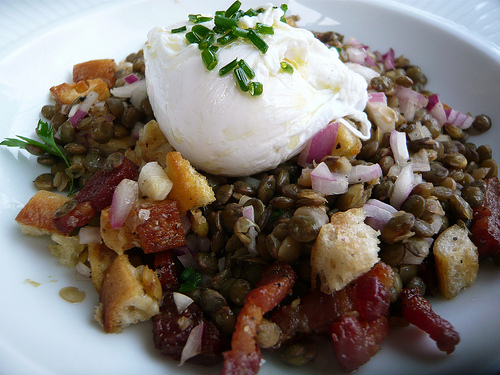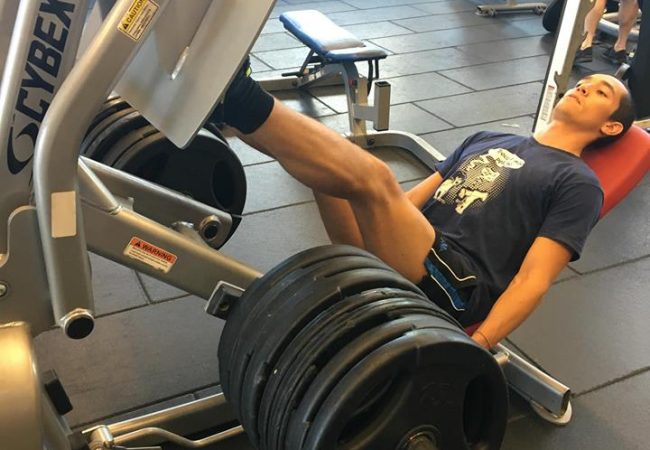Lones Wigger, double Olympic winner for shooting, shares the required mindset for success. I put it to the test at a competitive rifle range.

How to get 30g of protein in the morning
How to get 30g of protein in the morning:
- 2 whole organic eggs = 12g of protein
- 1/2 cup (100g) of lentils = 9g of protein
- 1/3 cup of mixed nuts = 9-15g of protein
Total: 30-45g of protein
Fastest way to cook it:
- Drizzle a bit of olive oil into a china bowl and swirl it around
- Crack the eggs into the bowl
- Whack it into a microwave for 60-90 seconds (700-800W)
- Get out a second bowl
- Put a handful of spinach, kale or other leafy greens in
- Once cooked pop the eggs on top
- Bung in a third of a cup of mixed nuts (Brazil Nuts and Almonds have the most protein)
- Total cooking time: 120 seconds
- Wash-up time: 60-120 seconds
FAQ:

Do I have to cook lentils?
Buy lentils in a tin (soaked in water) and you don’t have to cook them. They’ve been pre-boiled so you can just pour out the juice and add to your breakfast. You only need to cook lentils (soak in water and boil) if you buy them dry.
Automate your 30g protein breakfast
I now eat this 30g of protein every weekday morning for breakfast. It’s an automatic ritual utilising what Charles Duhigg calls The Power of Habit.
30g of protein in the morning achieves three things:
- Removes decision-making (time) from the morning
- Ensures I have protein for high-intensity training (HIT; see Lawrence Neal below) recovery
- Avoids glucose spikes so I don’t end up snacking all day
Why 30g of Protein in the Morning?
30g of protein in the morning has been said to raise your resting metabolic rate helping to lose fat while at the same time providing resources for muscle growth. (Q: could this be considered a biohack?)
Lawrence Neal & Doug McGuff
Lawrence Neal, producer of the #1 business, health and time optimisation podcast, Corporate Warrior, pointed me towards Doug McGuff and his incredible book, Body By Science.
Body By Science gives you an incredibly in-depth and detailed insight for the paleo diet and strength training biochemistry. Doug McGuff knows his shit and you should buy it now.
I had no prior knowledge to the science of the body. None. Had you asked me what gets ‘fitter’ when you run or exercise I would have said the heart and lungs. Now I know better.
If there is one video you should watch for health, fitness, building muscle, nutrition and biochemistry, it’s Doug McGuff explaining Body By Science to a bunch of 21 year-olds. It’s two hours long but give it 15 minutes and you’ll be hooked:
Body By Science introduces the idea of High Intensity Training (HIT). Developed from the research and testing of American professional body builder Mike Mentor (who in turn discovered it from Casey Viator, the youngest ever AAU Mr America), HIT advocates heavy weights for as many repetitions as possible, to total muscle fatigue), for very brief (20–45 minutes per session) and infrequent training sessions.
Doug McGuff also explains the biochemistry of glucose and how consuming too much turns into fat tissue.
The Paleo Diet, as Lawrence Neal neatly summarises, “excludes the consumption of dairy, processed/refined carbohydrate, refined sugar, and legumes.”
Consuming 30g of Protein for breakfast was made popular by Tim Ferriss, author of The 4-Hour Body. More of a catchy phrase than hard science, Tim advocated “30 in 30”: 30 grams of protein within 30 minutes of waking up. It should be thought of as more an approximate guide.
What’s your protein breakfast?
Do you have your own 30g protein breakfast? I would love to see it. Share your recipes in the comments along with any tips and feedback.
Photo by WordRidden 



